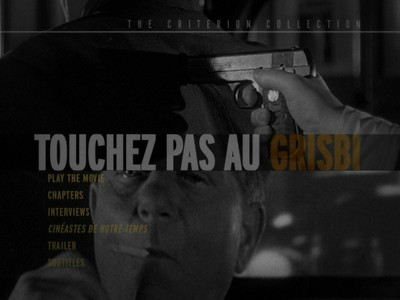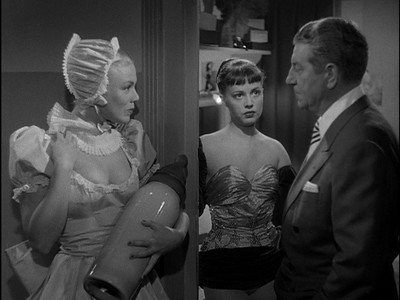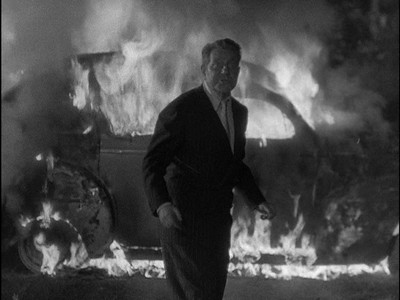
In Touchez pas au grisbi (1954), Jean Gabin's Max the Mentor precedes Jean Servais' Tony le Stephanois from Rififi by only a year, but in a way, the two are as far apart as they could get. Then again, there is a lot about them that is the same, as they are both aging gangsters who are seeing that their time in the crime game is growing short. You could almost turn these two films into companion pieces, a single epic about two friends on opposite sides of the tracks. Call it something like Rich Crook, Poor Crook.
Whereas Rififi is set in rundown streets and hollowed-out buildings, Jacques Becker's Touchez pas au grisbi (translation: "Hands off the loot!") shows us the ritzy Parisian nightclubs where men of means pursue their more lurid hobbies. Whereas le Stephanois has had a less than successful career that has included jail time, Max has managed to stay on top for the duration. His nickname denotes the level of respect that others have for him: he's seen it all and knows how it's done. He spends his nights enjoying himself, indulging in the ladies and what have you; yet, he also manages to stay disciplined. He eats properly, stays clean, maintains a personal order.

Perhaps sensing something is in the wind, Max decides it's time to move on. He has made a big score in gold with his longtime partner Riton (Rene Dary), and once he unloads it, he can go off the job. For a guy who values being in control, things are starting to slip away that will make this complicated. Riton has a new girl (a young Jeanne Moreau) and information from his loose lips passes to hers, and then on to Angelo (Lino Ventura), the drug dealer angling for the top spot. Max even tries to offer up his own protégé, Marco (Michel Jourdan), to plug the hole he will leave, but it's no good. Riton gets kidnapped, and now Max's last big score will have a totally different payoff.
In contrast to the control Max is losing over his own life, Jacques Becker exerts it in spades over his film. Touchez pas au grisbi is masterfully constructed, moving at a confident pace and building in tension and suspense as Max's predicament worsens. It would be easy to just pile the conflicts on the beleaguered hood, but Becker is exacting in his plotting, twisting the plot only when it makes sense, not just for the sake of having more kinks in the narrative. The finale of the picture is haunting and desolate, involving a burning car far off the beaten path, a flaming symbol of the tragic end that could await all of these players if they don't maintain the core values of loyalty and commitment to purpose that Max has always placed his trust in and that have carried him through this far.

As a personal aside, the scenes with the car in Touchez pas au grisbi bring to mind something that happened to me when I was younger. It was in my college years, during a period where I regularly drove back and forth from Los Angeles to where I lived in the high desert because there was nothing to do in our town. One night, on the opposite side of the freeway, I saw a car stopped in the middle of the road, its headlights on, and a man on his hands and knees in front of it, facing the vehicle. No one else saw it. I was driving, and my passengers insisted I was crazy. But I know I did, I know it was there.
I guess it's neither here nor there, and it seems like something out of a modern rural crime picture than Jacques Becker, but Grisbi makes me think of it all the same.
This was prepared as part of my review of the boxed set 10 Years of Rialto Pictures for DVDTalk.com.

1 comment:
It’s Max le Menteur, and menteur is French for “liar” not mentor. Doesn’t make sense to me either. Probably taken from the book, which I understand is very different than the movie.
Post a Comment